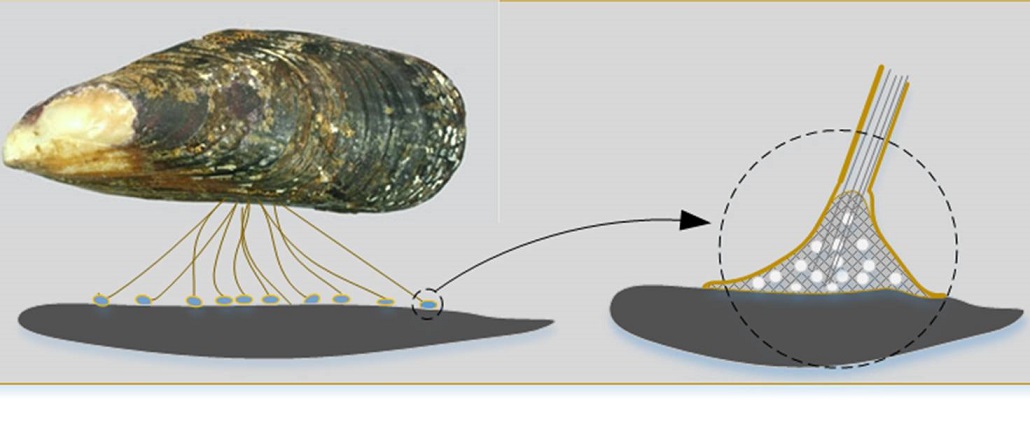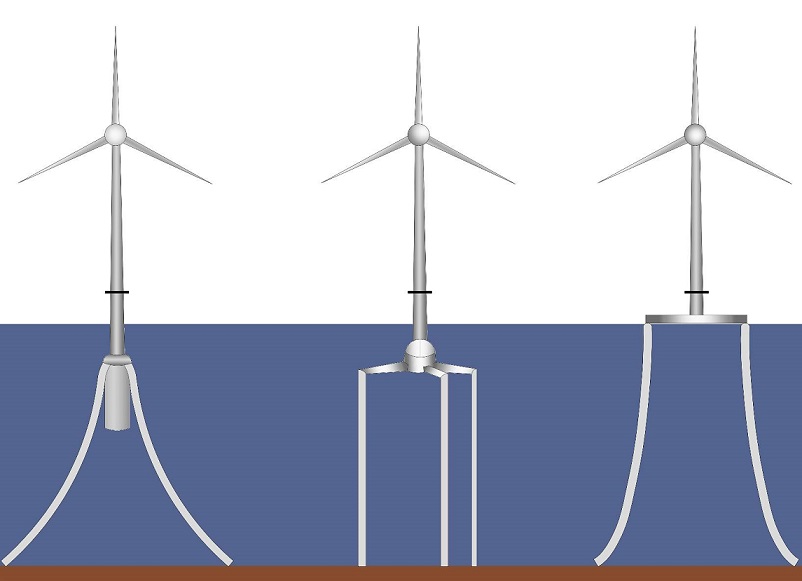Thursday, 04 March 2021
The University of Nottingham is investigating how sea mussels stick to wet and wave-hit rocks using collagen-rich sticky threads, ending in adhesive pads, known as plaques. The findings could help to solve the man-made challenge of how best to anchor the floating foundations of an off-shore wind farm to the sea bed.
By learning exactly how mussel plaques adapt to grip on to different surfaces, the researchers aim to unlock novel engineering solutions with real-world applications.
The design principles of this natural phenomenon could inspire new ways to securely join dissimilar man-made materials, preventing them from pulling apart when subjected to stress and weight.
The multiple thread-plaque system of mussels could, for example, help to solve the man-made challenge of how best to anchor the floating foundations of an off-shore wind farm to the sea bed.

Engineers are yet to find a reliable way to fix cables from the foundation into the ground, in a system that can withstand the weight of the turbines and the forces of rough oceans and high winds.
The three-year project also aims to mimic the unique structural characteristics of sea mussel plaques, to inform the design of new, ultra-lightweight and porous yet durable materials for use in aerospace and transportation manufacturing.
“Mussels can achieve a steadfast grip on pretty much any material surface even while being pounded by the sea. Their adhesive pads demonstrate an incredible load-bearing capacity, and the stiffness and the surface texture pattern of the material they stick to play important roles in that behaviour. However the exact physical mechanism of the plaque-surface interaction has not yet been established. Discovering this will provide engineers with an inspiring example of how different materials can be joined together to resist external stresses. This gives us an opportunity to explore new engineering solutions by bio-mimicking sea mussel plaques.”
The adhesive structure of a mussel plaque consists of an outer, dense protective cuticle layer and a low density, porous plaque core, which work in a cooperative way. A plaque core exhibits a highly porous structure, consisting of a foamy network of pores at different length scales and reinforced by fibre bundles.
Existing research has demonstrated that a plaque core can achieve good load bearing capacity and strength under tension and shear (forces that cause layers or parts to slide against each other in opposite directions). In contrast, manmade porous materials such as foams or honeycombs have very limited load bearing capacity and strength under the same forces.

The team will also characterise the adhesive structure of a mussel plaque using advanced imaging facilities at the University. 3D printing technology or Electron Beam Lithography will be used to recreate surface texture patterns of materials such as silica glass, silicone rubber and polycarbonate down to the micron-scale. The researchers will then use those findings to manipulate the stiffness and the surface texture pattern of materials to understanding how this can influence plaque adherence.
Test samples copying the internal structures of a mussel plaque core formed under various forces, and with different materials, will be manufactured using 3D printing technology, as will material joints inspired by this natural behaviour.
Meanwhile, a test rig will be built to analyse the way the plaque responds to various loading scenarios when it is attached to different materials. Traction force microscopy (TFM) will also be adopted for the study to measure the forces exerted by a mussel plaque on a surface it is gripping.
Story credits
More information is available from Dr Tao Liu on tao.liu@nottingham.ac.uk or Emma Lowry, Media Relations Manager (Engineering) on emma.lowry@nottingham.ac.uk or 0115 84 67156.
Notes to editors:
About the University of Nottingham
Ranked 97 in the world and 17th in the UK by the QS World University Rankings, the University of Nottingham is a founding member of Russell Group of research-intensive universities. Studying at the University of Nottingham is a life-changing experience, and we pride ourselves on unlocking the potential of our students. We have a pioneering spirit, expressed in the vision of our founder Sir Jesse Boot, which has seen us lead the way in establishing campuses in China and Malaysia - part of a globally connected network of education, research and industrial engagement.
Nottingham was crowned Sports University of the Year by The Times and Sunday Times Good University Guide 2024 – the third time it has been given the honour since 2018 – and by the Daily Mail University Guide 2024.
The university is among the best universities in the UK for the strength of our research, positioned seventh for research power in the UK according to REF 2021. The birthplace of discoveries such as MRI and ibuprofen, our innovations transform lives and tackle global problems such as sustainable food supplies, ending modern slavery, developing greener transport, and reducing reliance on fossil fuels.
The university is a major employer and industry partner - locally and globally - and our graduates are the third most targeted by the UK's top employers, according to The Graduate Market in 2024 report by High Fliers Research.
We lead the Universities for Nottingham initiative, in partnership with Nottingham Trent University, a pioneering collaboration between the city’s two world-class institutions to improve levels of prosperity, opportunity, sustainability, health and wellbeing for residents in the city and region we are proud to call home.
More news…